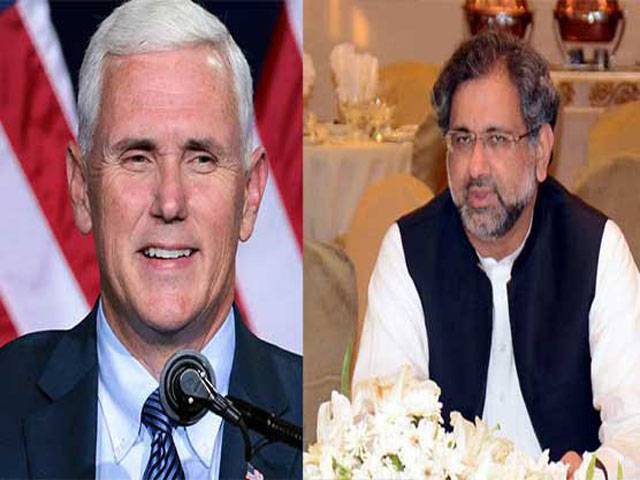ISLAMABAD - Prime Minister Shahid Khaqan Abbasi’s meeting over the weekend with Vice President Mike Pence in Washington seems to have gone in vain after an even harsher message from the United States to “do a lot more”.
On Wednesday, the US said Pakistan was headed towards the “right direction” but “a lot more needs to be done”.
Prime Minister Abbasi, who is now back home, had held a meeting with Mike Pence in Washington on March 16 during his “private visit”, seen by many as a “secret official visit”.
An official statement after PM Abbasi’s meeting with Pence said: “Both the leaders discussed to find more ways to enhance bilateral cooperation between the two countries.”
During a news briefing, Heather Nauert, the spokesperson for the US State Department, said: “We have certainly seen Pakistan take some positive steps in the right direction, but a lot more needs to be done, in terms of Pakistan cracking down not just on the Taliban, but the Haqqani Network and other terror networks as well.”
She added: “Vice President Mike Pence met with the Prime Minister Abbasi of Pakistan last week. They talked about the overall south Asia strategy, the administration’s south Asia strategy, and that’s one of the things that the vice president addressed with him. He said the government of Pakistan has to do more to address the continued presence of terrorism in Pakistan.”
Senior officials at the foreign ministry told The Nation that the State Department statement was not a “surprise” for Pakistan.
“The meeting of the PM with Mike Pence had been positive but they [the US] have not of course changed their policy towards Pakistan,” said one official.
He added: “We have conveyed to the US that we are doing a lot more than we could. We are committed to fight terrorism but need acknowledgment for our anti-terror efforts and our successes.”
Last month, the Financial Action Task Force discussed a US resolution to place Pakistan on the terrorist financing watch-list.
The FATF’s official statement after the meeting did not mention Pakistan but it would still be included in the watch-list in June this year.
Only Turkey supported Pakistan in the FATF meeting in Paris.
The US Deputy Assistant to the President and National Security Council Senior Director for South and Central Asia, Lisa Curtis, visited Islamabad this month and held meetings with Foreign Secretary Tehmina Janjua, Interior Minister Ahsan Iqbal and National Security Adviser Nasser Khan Janjua.
They discussed the overall Pakistan-US ties and the Afghanistan issue.
Before the FATF shock, the US had in January suspended the security assistance to Pakistan targeting the Coalition Support Fund.
Nauert said Pakistan would be able to receive the suspended funding if it took “decisive actions” against the Haqqani Network and the Afghan Taliban.
The US Defense Intelligence Agency this month said Pakistan’s efforts in the war against terrorism had had some success in reducing violence from militancy and sectarianism.
The report submitted to the US Senate’s Armed Services Committee read: “Islamabad is likely to proceed with its counterinsurgency operations and border management efforts along its western border, while sustaining counterterrorism and paramilitary operations throughout the country. These efforts have had some success in reducing violence.”
It added: “Pakistan will look to the United States and the Afghan government for support against anti-Pakistan fighters in Afghanistan.”
The official statement after the Abbasi-Pence meeting had said Pakistan and the US were eager to “stay engaged” and carry forward the relationship that had been under strain.
Foreign Office spokesperson Dr Mohammad Faisal said the Pak-US relationship was based on trust and mutual respect.
He said Pakistan took respite in the fact that it was the only country in the region to successfully check and turn the corner in its fight against terrorism by conducting indiscriminate and comprehensive counter-terrorism operations.
International affairs expert Dr Huma Baqai said the US south Asian policy clearly indicated that the US wanted to maintain strong and good ties with India.
“In its fight against terror, Pakistan has eradicated the menace from Pakistani soil by rendering matchless sacrifices. Pakistan has conveyed its clear stance to the US that we are not responsible for the worst security situation in Afghanistan,” she said.
Baqai said it was the responsibility of the US and Afghan forces to maintain peace in Afghanistan and establish its writ on the ungoverned areas of Afghanistan.
“The US wants to scapegoat Pakistan for its failures and mistakes. We should cooperate with the US but should not allow them to hold us responsible for their own failures,” she remarked.






